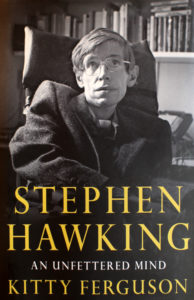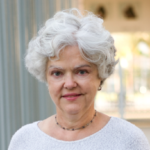Lecture Date: February 18, 2020
The Dovetail Cultural Resource Group Lecture

“It’s been a remarkable journey.” With those words Kitty Ferguson describes her thirty years knowing and writing about Stephen Hawking. When she first met him in 1989, he had recently published his A Brief History of Time. He was also already trapped silent in a wheelchair, able to shift just one or two fingers to operate his communications system, tediously, word by word. The inexorable progress of Motor Neuron Disease had begun more than twenty-five years earlier when he was a first-year graduate student in the University of Cambridge.
Hawking’s legacy consists of more than stunning ideas, scientific advances and theories. His adventurous spirit ensnared a generation of younger scientists. He gave a priceless gift of inspiration to disabled people and others of us who have had to adjust our attitudes about disability.
Who was this man? This scientist who so often changed his mind and undermined his own previous discoveries . . . who bequeathed to his field questions others will spend decades answering . . . who took readers and lecture audiences laughing into black holes and to the origin of the universe . . . who toughed it out against odds that would have destroyed almost anyone else?
Stephen Hawking relished his work and life in a manner totally his own, an enigma even to those who knew him best. In spite of the difficulties, his was a life well lived.
Speaker: Kitty Ferguson

Kitty Ferguson graduated from the Juilliard School of Music in 1966 and for twenty years followed a successful career in music – an unlikely background for someone who would become the chief chronicler of the life and science of legendary physicist Stephen Hawking. She first met Hawking in Cambridge in 1989. Her first book about him, written with his help, was Stephen Hawking: Quest for a Theory of Everything (1991), a worldwide bestseller. Over thirty years, she has kept his story up to date in four revised editions, concluding with Stephen Hawking: A Life Well Lived, which appeared in March 2019, a year after his death. Ferguson has been much praised for her in-depth, sensitive treatment of Hawking’s personal story and her ability to make complicated science accessible to non-scientists. In 2000, she helped Hawking translate the jargon of physics into everyday language for his book Universe in a Nutshell.
Of her nine books about subjects in the history and philosophy of science, Ferguson’s particular favorites are The Fire in the Equations: Science, Religion, and the Search for God, and a double biography, Tycho and Kepler, focusing on these two men’s brief, dysfunctional, enormously fruitful collaboration.
Ferguson traces her love and understanding of science to her childhood. Her father, also a musician, had a passion for science and mathematics and a gift for explaining them to his young children.